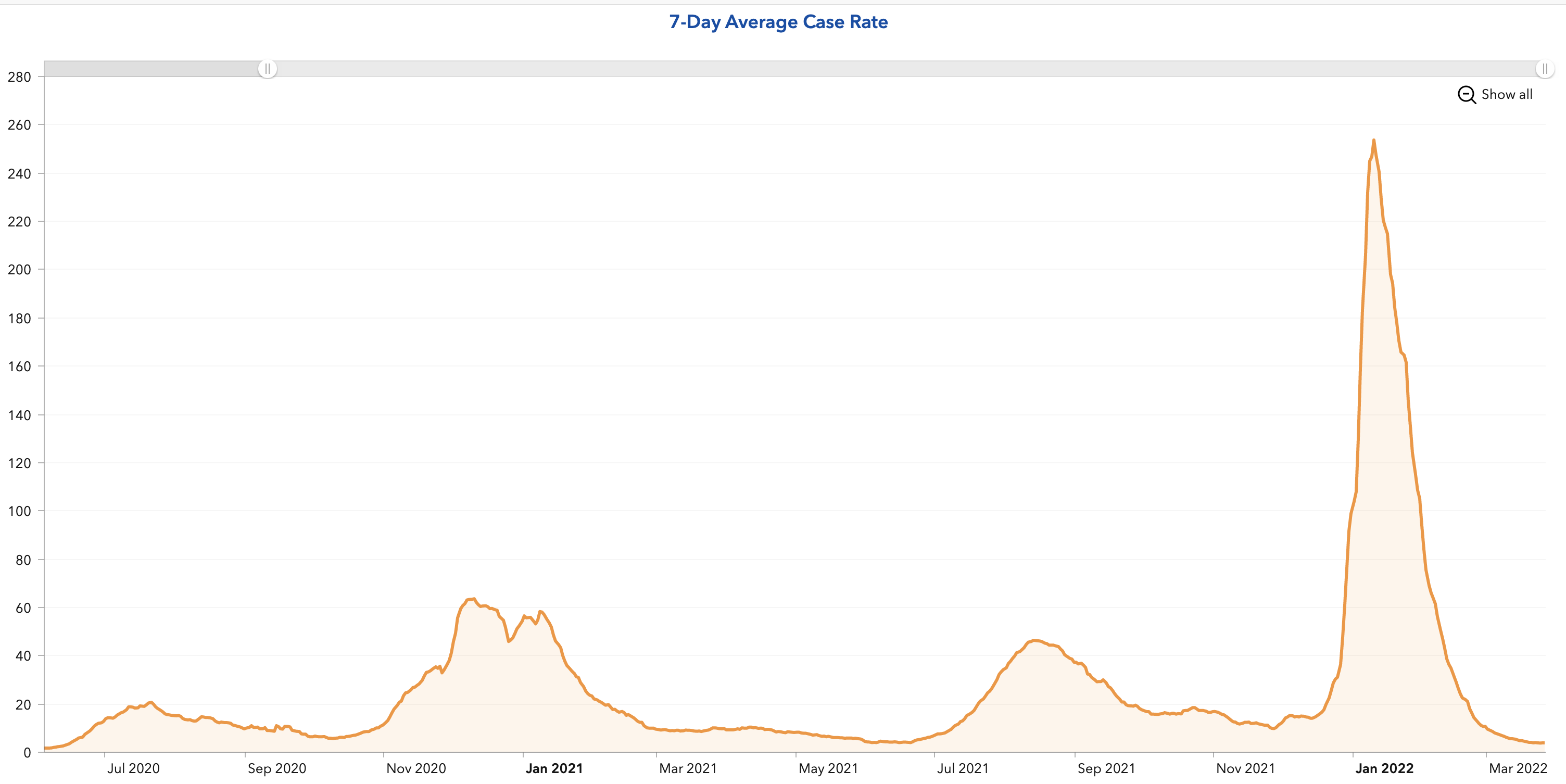Should You Get ANOTHER Booster Shot?

Sacramento County COVID case rate data, April 2020-March 30, 2022 (source)
The US Food and Drug Administration has “authorized” second COVID-19 boosters for people 50 years and older. (STAT News) For most vaccinated Americans, a second booster would be a fourth dose of COVID vaccine.
Should you get the shot?
A lot of people have asked me this question.
Let’s jump to the punchline: For most people, do what makes you comfortable, because the details are extremely messy, uncertainty/lack of data is high, and we’re talking about population-based probabilities not individual preferences or risk tolerance.
Ground Rules
Having said that, let’s rehash the basics.
All US-approved COVID vaccines provide excellent-to-stunning protection against severe coronavirus disease, hospitalization and death. The miracle of this pandemic is the speed with which these very safe, very effective vaccines were made available to all Americans. The tragedy is the unwillingness of so many Americans to take advantage of this cheap, easy protection. If you have not taken the initial series of 2 doses of Moderna, Pfizer, or Johnson & Johnson’s vaccine, you are needlessly putting your health at risk. Whether that risk is closer to driving without a seatbelt or skydiving without a parachute depends on your age, health status, and the prevalence of the virus in your community.
All COVID vaccines provide modest protection against infection. Vaccinated people clearly can test positive for the virus and spread it to others. Vaccinated people clearly can get sick from the infection. But they do so at lower frequency than unvaccinated people. Before you say, “vaccines don’t work,” see previous paragraph.
Immunity against COVID decreases with time. Whether you are immunized by a 2-shot vaccine or by natural infection in the wild, 3-6 months later your ability to swiftly resist a coronavirus infection will have waned. Not to zero, mind you. Not even close. We’re talking about a sliding scale, not an on/off switch.
About the time the largest cohort of vaccinated Americans entered a period of declining protection, the virus also evolved. New variants (delta and omicron) were not specifically the target of the vaccines, so between the passage of time and the immune evasion of the circulating viral strains, it became wise to give everyone a 3rd shot, or first booster. Getting this shot reset the clock on people’s immune protection. The first booster turned out to make a big difference during the omicron wave this winter, as boosted people died at a lower rate than unboosted.
But keep in mind, the amount of benefit from an initial vaccine series is always greater than a booster. It may be important to maintain your immunity with booster shots, but getting the first vaccination was even more important.
Final point of clarification: The FDA has “authorized” the second booster for people age 50+. It has not “recommended” it. Here’s a quote from the STAT News article:
Health officials framed the second booster as an option that could offer older adults and people with health conditions more robust protection, but they did not urge everyone now eligible for shots to get them immediately. Another booster “is especially important for those 65 and older and those 50 and older with underlying medical conditions that increase their risk for severe disease from Covid-19,” CDC Director Rochelle Walensky said in a statement.
Risk vs Benefit
Recall that every single medical intervention, from taking an aspirin to having open heart surgery, should be evaluated from a risk-benefit perspective. Because any action carries with it the possibility of an adverse outcome. The question is, how likely is an unwanted consequence compared to the benefit I can get? In the case of COVID vaccines, some people (including me!) get pretty sick in the first day or two after a shot. That’s worth it if the shot is helping me a lot in the long term. But I won’t take it if it’s not going to make any difference.
Your Decision: About You
So how should you weigh your choice to get the 4th dose at this time? Here’s what you should consider.
Your Health:
- Did you test positive for COVID during the big omicron wave in January? That infection was your booster. You can sit out this round.
- If you are immunocompromised, this will be your fifth shot (three for initial series, one booster, now a second booster). You should take it. The benefit to you is greater than to other people.
- If you have a medical condition that increases your risk of severe COVID disease, the benefit of a booster may be significant. The CDC lists what those conditions are.
Your Age:
- The older you are, the less reliable your immune response and the higher your risk of dying of COVID. That means the older you are, the greater benefit to you of a booster.
Your Attitude & Lifestyle:
- Are you COVID skittish? Still very afraid? Then by all means get another shot. I know somebody who is not immunocompromised who already sought a 5th dose, because he wants to do everything possible.
- Do you travel? Go clubbing? Dine in restaurants or attend indoor events often? Your lifestyle gives you many potential exposures to the virus.
- Do you have a special event coming up where you’ll be around vulnerable people such as a bunch of elderly relatives? An in-person conference? Are you traveling outside the US and will need a negative test to re-enter the country? These are examples of situations where another booster could be of greater benefit to you than someone else.
- Did you get vaccinated only because you were forced to, or somebody nagged you into it? I recommend a 3rd dose right now, but I wouldn’t pressure you for a 4th if you are already boosted.
Your Decision: External Considerations
The risk / benefit analysis isn’t all about you. Here are two important factors.
Variants and a new vaccine
All the COVID vaccines currently used in the US were made against the original Wuhan strain of the virus. As you well know, the virus has evolved (changed) significantly since then. I predict that by this fall, the US will be distributing at least one updated vaccine that has been modified to better match the existing variants. If you’re on the fence, you might wait and see how long it takes.
Community prevalence of the virus
This is by far the most important factor that people ignore. If there’s a lot of coronavirus circulating in your community, the benefit of a booster is higher. If nobody at the grocery store or gym is infected, then the benefit of a booster is less.
For me personally, this is the decisive factor. I’m not getting a fourth shot at this time. I’m over 50, but have no medical risks. I travel and eat out, but the shots can knock me to bed for a day. So exposure risk is the consideration I’m giving the greatest weight.
The most recent data from Sacramento County (source) are graphed above. The COVID case rate is 3.9 (per 100,000 population), the lowest it has been since the pandemic began.
At that rate, my chance of encoutering the virus is very low, which makes the potential benefit of a booster shot also very low. I will monitor local prevalence. With summer starting, I expect rates to remain low. If a new variant causes a rise in cases, or if autumn brings a seasonal surge, I’ll get another shot. My expectation / prediction is this will become an annual boost, administered at the same time (or even in the same injection) as my annual flu shot in the fall.
Questions? amy@amyrogers.com
Amy Rogers, MD, PhD, is a Harvard-educated scientist, novelist, journalist, and educator. Learn more about Amy’s science thriller novels at AmyRogers.com.


